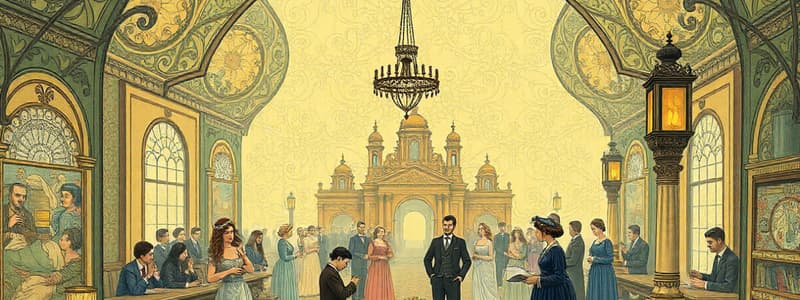Podcast
Questions and Answers
What framework influences individual behavior and societal interactions?
What framework influences individual behavior and societal interactions?
- Culture
- Deviance
- Social structure (correct)
- Socialization
Which type of culture includes artifacts and physical objects?
Which type of culture includes artifacts and physical objects?
- Material culture (correct)
- Symbolic culture
- Cognitive culture
- Non-material culture
What is the primary process through which individuals learn societal values and norms?
What is the primary process through which individuals learn societal values and norms?
- Socialization (correct)
- Assimilation
- Subculturing
- Acculturation
Which of the following is a characteristic of primary groups?
Which of the following is a characteristic of primary groups?
What does social stratification refer to?
What does social stratification refer to?
Which perspective primarily focuses on power differentials and social inequality?
Which perspective primarily focuses on power differentials and social inequality?
Which of the following methods focuses on numerical data to identify patterns?
Which of the following methods focuses on numerical data to identify patterns?
Which sociologist is known as the Father of sociology and introduced positivism?
Which sociologist is known as the Father of sociology and introduced positivism?
Study Notes
Definition
- Sociology: The study of society, social behavior, and social institutions.
Key Concepts
-
Social Structure
- Framework of society consisting of institutions, organizations, and relationships.
- Influences individual behavior and societal interactions.
-
Culture
- Shared beliefs, values, norms, and practices of a group.
- Includes material (artifacts) and non-material (values, customs) culture.
-
Socialization
- Process by which individuals learn and internalize the values and norms of their society.
- Key agents: family, schools, peers, media.
-
Groups and Organizations
- Primary Groups: Close, personal relationships (e.g., family).
- Secondary Groups: Larger, more impersonal (e.g., work, community organizations).
-
Social Institutions
- Structures that govern behavior in specific areas (e.g., family, education, religion, economy, government).
-
Social Stratification
- Hierarchical arrangement of individuals in society based on wealth, race, education, and power.
- Key concepts: class, status, and power.
-
Deviance
- Behavior that violates social norms.
- Can be formal (crime) or informal (social taboos).
-
Social Change
- The transformation of culture, behavior, social institutions, and social structure over time.
- Influenced by technology, social movements, and policy changes.
Research Methods
-
Quantitative Methods
- Surveys, experiments, and statistical analysis for data collection.
- Focus on numerical data to identify patterns.
-
Qualitative Methods
- Interviews, ethnography, and content analysis.
- Focus on understanding meanings and experiences.
Theoretical Perspectives
-
Functionalism
- Views society as a system of interconnected parts; each part has a function that contributes to stability.
-
Conflict Theory
- Emphasizes power differentials and social inequality; highlights conflict between groups.
-
Symbolic Interactionism
- Focuses on day-to-day interactions and the meanings individuals attach to those interactions.
-
Feminist Theory
- Analyzes gender inequality and advocates for women's rights and gender equity.
Important Figures
- Auguste Comte: Father of sociology; introduced positivism.
- Karl Marx: Focused on class struggle and economic factors in society.
- Emile Durkheim: Studied social integration and collective consciousness.
- Max Weber: Emphasized understanding social actions through subjective meanings.
Applications of Sociology
- Policy development, community planning, education, healthcare, and social services.
- Helps in understanding social issues like crime, poverty, and discrimination.
Definition
- Sociology examines the intricacies of society, behaviors, and institutions.
Key Concepts
- Social Structure: Comprises institutions, organizations, and relationships that influence individual actions and societal interactions.
- Culture: Encompasses shared beliefs, values, and norms, divided into material culture (artifacts) and non-material culture (values and customs).
- Socialization: A learning process where individuals internalize societal values and norms, significantly shaped by family, education systems, peer groups, and media.
- Groups and Organizations: Differentiated into primary groups (intimate relationships like family) and secondary groups (larger and more formal associations such as workplaces).
- Social Institutions: Established systems that govern behavior in areas like family dynamics, education frameworks, religious practices, economic systems, and governmental structures.
- Social Stratification: A hierarchical classification based on wealth, race, education, and power, involving concepts like class, social status, and authority.
- Deviance: Actions that breach societal norms, categorized into formal (criminal behavior) and informal (social taboos) deviance.
- Social Change: Refers to the evolution of cultural norms, behaviors, institutions, and social structures, driven by factors such as technology and social movements.
Research Methods
- Quantitative Methods: Utilize surveys, experiments, and statistical analysis to gather numerical data and detect patterns within society.
- Qualitative Methods: Emphasize understanding social phenomena through in-depth interviews, ethnography, and content analysis to capture meanings and experiences.
Theoretical Perspectives
- Functionalism: Analyzes society as a system of interdependent parts, where each component plays a vital role in maintaining stability.
- Conflict Theory: Focuses on power dynamics and social inequalities, emphasizing ongoing conflicts between different social groups.
- Symbolic Interactionism: Investigates everyday interactions, concentrating on the meanings individuals derive from these interactions.
- Feminist Theory: Critiques gender inequalities, advocating for women's rights and striving for gender equity.
Important Figures
- Auguste Comte: Recognized as the father of sociology; introduced the concept of positivism.
- Karl Marx: Analyzed the significance of class struggle and economic influences within society.
- Emile Durkheim: Examined aspects of social integration and collective consciousness.
- Max Weber: Highlighted the necessity of understanding social actions through the lens of subjective meanings attributed by individuals.
Applications of Sociology
- Valuable in various fields such as developing policies, community planning, educational frameworks, healthcare initiatives, and social services.
- Enhances comprehension of pressing social issues like crime, poverty, and discrimination.
Studying That Suits You
Use AI to generate personalized quizzes and flashcards to suit your learning preferences.
Description
Explore the fundamental concepts of sociology, including social structure, culture, and socialization. This quiz covers the roles of groups, organizations, and social institutions in shaping individual and societal behavior. Test your knowledge on social stratification and the dynamics of social interactions.




